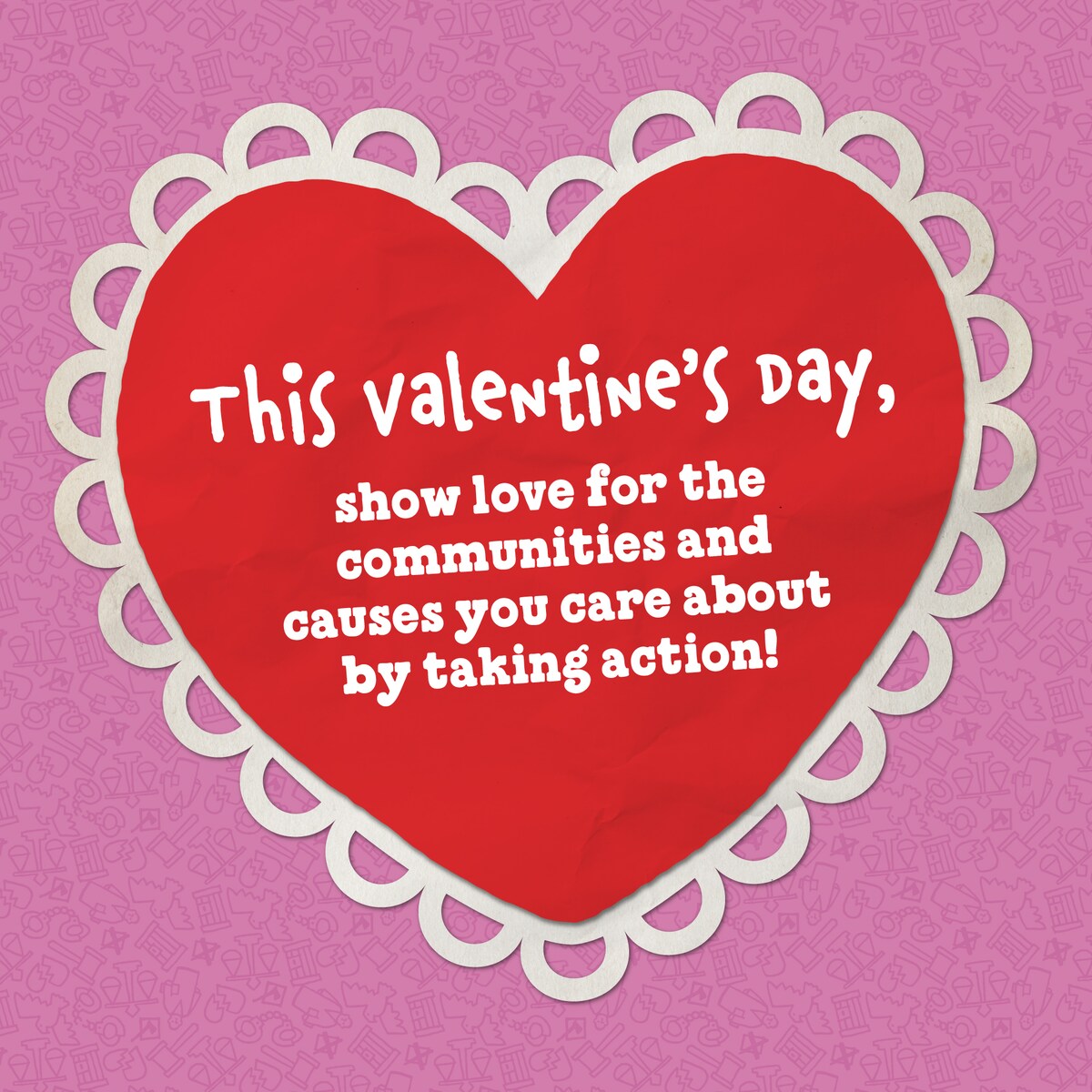July 5, 2022
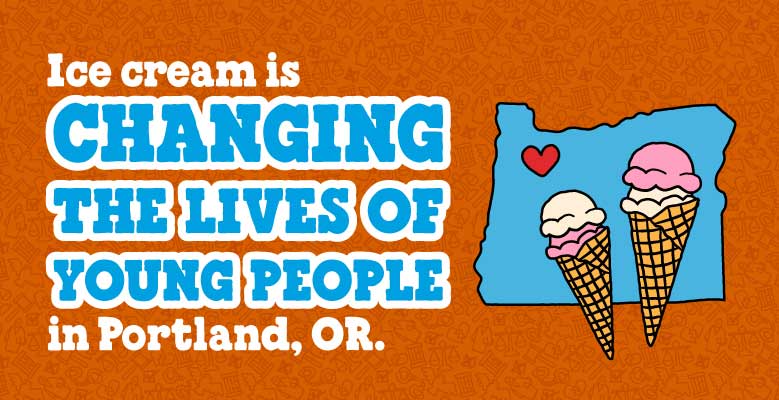
New Avenues for Youth is a Portland, Oregon-based nonprofit that’s dedicated to the prevention and intervention of youth homelessness. They’ve impacted more than 30,000 young people (ages 9-24) since 1997, doing everything from supporting basic needs like meals and counseling to providing opportunities for education, job training, employment, and housing.
The job training is where we come in! In 2004, New Avenues opened a Scoop Shop as part of Ben & Jerry’s “PartnerShops” initiative, which used Scoop Shops to help drive change in communities. That program ultimately came to an end, but New Avenues continues to use their PartnerShop (which also happens to be the last PartnerShop in existence!), along with New Avenues INK, their for-profit screen-printing business, to provide job training and career mentoring for the young people they serve and support.
We recently got the chance to talk to Sara Weihmann, New Avenues’ Director of Social Enterprise, about their PartnerShop and all the vital work New Avenues is doing in Portland.
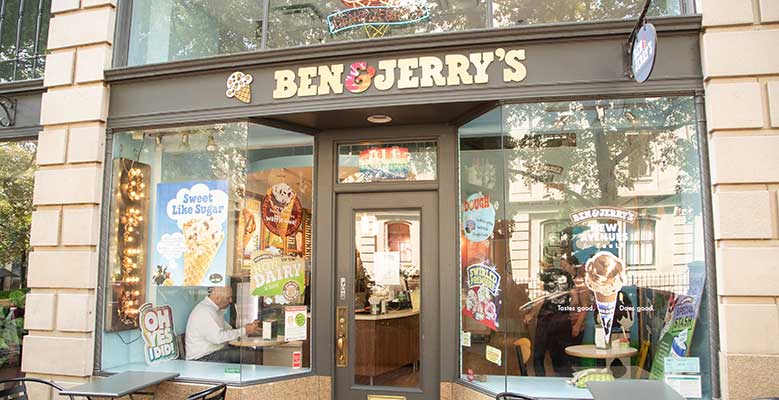
Can you talk a little about New Avenues and what your role is there?
New Avenues for Youth exists to support young people experiencing homelessness and housing instability. We believe they know what's best for themselves, so we approach this work by building relationships and asking them a lot of questions about what they want and the choices they're making, and how they feel about those choices. Our goal is to help connect them to resources they need to be successful, however they define success for their own lives.
I've been the Director of Social Enterprise at New Avenues for almost ten years! I love the opportunity to support young people in career exploration and also to connect them to opportunities in the workforce. We use the social enterprises we own and operate, like the PartnerShop, to offer youth the chance to orient to traditional jobsite expectations in a supportive environment. It’s continually humbling to have 18- to 24-year-olds invite you into their personal journey. And it's amazingly rewarding to see how our job-training program has supported individual humans along their trajectory toward finding meaning in their own lives.
What kinds of programs and services does New Avenues provide?
So many! New Avenues has a wide range of programs to support the various needs of young people. Our Drop-In Center, for instance, offers three meals a day in a safe space where young people can gather and connect with their community, access mental health and addiction services and hygiene supplies, engage in group activities, and connect with their support team to navigate what they’re going through.
We also have programming that gets people from surviving to thriving, whether it’s housing, education, employment, or all of the above. Our education program helps youth with attaining GEDs, credit recovery for graduating from high school, and navigating financial aid to access post-secondary education. Our employment team supports youth with career exploration, mentorship, job-readiness training, and job search. We have a team of housing navigators who help young folks navigate a very complicated and competitive landscape for affordable housing. We operate several group housing sites, including our Transitional Housing in downtown Portland, our New Meadows housing program for youth formerly in or transitioning from foster care, and Unity House, a culturally specific housing program for LGBTQIA2S+ youth. The goal is not only to support young people who are seeking alternatives to sleeping outside or in vehicles or doubling up, but to help them address any number of barriers they may be facing as they plan for the future.
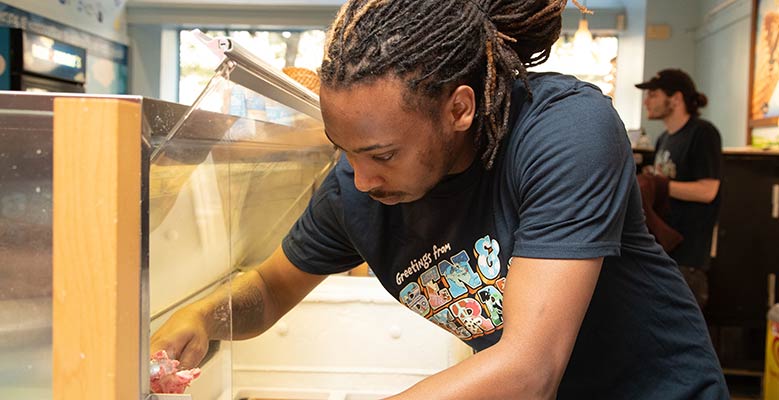
What’s the scoop on the New Avenues Ben & Jerry's Scoop Shop?
Our PartnerShop opened in 2004 and continues to host young people seeking work experience. I would say about half of the interns are referrals from internal New Avenues programs, and the other half are referred by other youth-serving providers in our community. Most folks have never had a traditional job before and have some mix of both curiosity and nerves about working.
The shop provides this unique environment where on-the-job training and mentorship can occur, where young people can build healthy relationships with their peers and engage with a community of customers around a product everyone is excited about. Youth interns grow confidence here and develop foundational skills that can help them find and retain their next job.
How does your shop benefit or complement your nonprofit work?
Connecting young people with earning opportunities supports them on their road to economic stability. Our PartnerShop offers a food-service, customer-facing type of job experience that provides a great starting point for youth seeking jobs in the service industry. It’s the kind of first job that has translatable skills to almost any type of future job, really.
New Avenues’ experience operating the PartnerShop also grew our strength as an agency in the social enterprise field. It inspired us to create a portfolio of businesses that could provide young people different kinds of industry training in a similar type of environment. In 2013, we opened a screen-printing shop, New Avenues INK—a completely different industry, but with a similar job-training environment for interns.
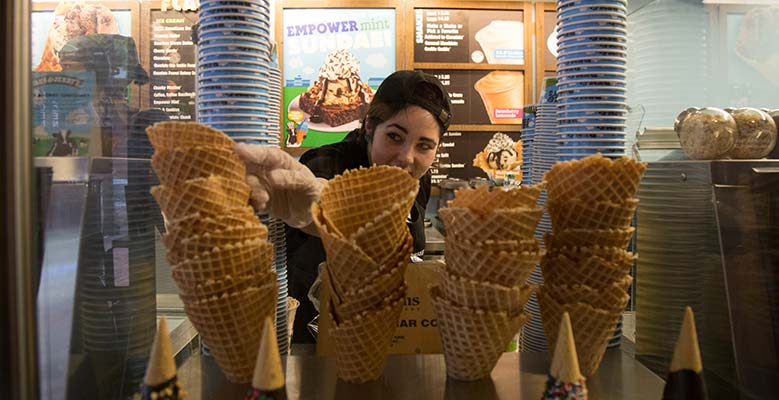
Can you talk a little more about what it’s like for a young person to have access to this kind of experience?
Working a first job can be super intimidating for anybody—consistently arriving on time, accepting supervisor feedback gracefully, finding ways to stay engaged and positive while doing repetitive or unglamorous tasks. It can be especially challenging for folks who are navigating trauma and complex barriers in their lives. Our social enterprise sites exist to allow young people with these backgrounds to dip their toe into the world of traditional work in an extra supportive environment. The expectations they find here will reflect what they are likely to have at their next job, and we offer additional support to help them orient to these standards.
We invest a lot of energy in having strength-based conversations with young people from a place of curiosity when they are falling short of job expectations. We recognize mistakes as learning opportunities. We remind them of the job expectations we have, ask about what is getting in the way, and support them in addressing those challenges. If someone is chronically showing up late, for example, the solution could be coaching around setting that alarm a few minutes earlier, revisiting bus schedules, or getting subsidized bus passes. Our employer model is flexible and empathetic to help youth learn and gain confidence for entering (or re-entering) the workforce.
Let’s talk about the history of New Avenues. What need was it responding to in the community originally, and how has it evolved over time?
New Avenues was founded 25 years ago by a group of generous community members who really wanted to provide relief to young people living on the streets. At the time, the population we served was generally younger than it is today (more like 9- to 18-year-olds) and consisted of young people sleeping outside in downtown Portland who needed meals, supplies, and connection.
Youth homelessness looks much different in Portland now. It’s more than just young people sleeping outside—we’re seeing many youth who are unstably housed, doubled up, couch surfing, disconnected from school and the workforce, experiencing abuse and neglect at home, impacted by sex trafficking and gang activity, and much more. In the last decade, New Avenues has increasingly focused on prevention to stop homelessness before it starts for young people in these kinds of circumstances. For example, our PDX-Connect program supports youth transitioning from foster care—a group at high risk of experiencing homelessness (a reality we see every day in the large numbers of youth formerly in care engaged in our homelessness intervention services). Our culturally responsive New Day program supports youth engaged in sex trafficking—also a group that experiences housing instability. The goal is to build meaningful relationships with young people, reach them earlier, and meet them where they are.
Are you still focused on downtown Portland?
New Avenues’ was founded in response to critical, in-the-moment needs for young people sleeping outside in downtown Portland. Over the years, as the needs and geographies of the population we serve have changed, we’ve adjusted and expanded our programming to be sure we’re finding the youth who are most disconnected and that our programming is addressing the challenges they face wherever they are. For example, over the last decade and a half, gentrification has pushed racially and culturally diverse youth and families out of urban Portland into suburban East Multnomah County. To be sure we’re there for youth and families, we opened a program site in East County known as the Youth Opportunity Center, which is now a hub for many community-based services. We also recently expanded services into suburban/rural Clackamas County through The Living Room, a culturally specific organization supporting LGBTQIA2S+ youth that recently became a program of New Avenues.
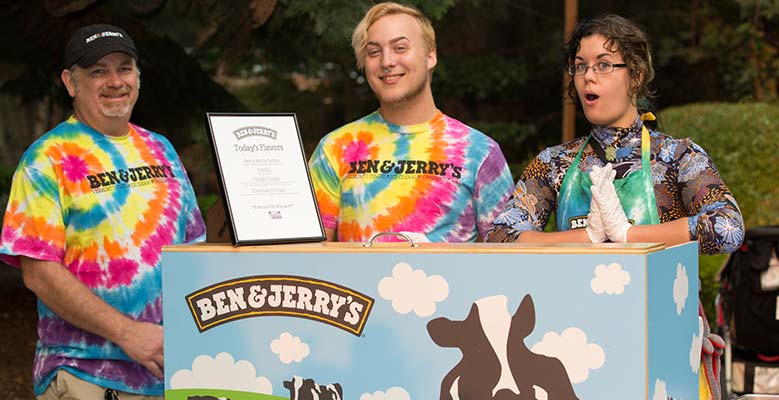
In your experience, what’s behind the issue of homelessness in the Portland area?
The issue of homelessness in Portland can’t be separated from the historical and current impacts of racism and the intersections of racial disparity and poverty. Black and Brown people are significantly over-represented in populations of youth and adults experiencing poverty and homelessness in our community.
The foster-care system is also a major contributor to homelessness. Youth in child welfare usually don’t have consistent, supportive people in their lives. It’s just devastating, and it puts them at greater risk of homelessness. So you can't talk about youth homelessness without acknowledging the impact of the foster-care system.
Another significant segment of our client population is young people who identify as LGBTQIA2S+. They are often not seen, supported, or safe in their living situations and are also over-represented in populations experiencing homelessness.
Another contributor is substance use and addiction. We need to focus on care and harm reduction for people who are using instead of criticizing and punishing them. To punish people for being addicted to substances is just not fair, and it’s not right.
And we have to acknowledge that the pandemic has created a huge, acute need in our youth population for everything from mental-health support to food, financial resources, and affordable housing. It’s been really challenging to reach people, connect with them, and help them navigate their way to those resources. And that human connection is more important now than ever.
Speaking of human connection, you’ve worked with so many people over the years—are there any stories that spring to mind of people who’ve gone through your programs and come out the other side to find themselves, find something they love to do, or just find a way forward?
I've probably seen about 900 young people go through our job-training program, and the experience and results are different for everyone. Not everybody’s trajectory is the same. There might be a nice, smooth growth curve for some, and a lot of fits and starts for others.
I recently had this young person in our Ben & Jerry's PartnerShop who was promoted from scooper to shift lead, then to assistant manager over a couple years. She was given a very high level of responsibility and eventually went as far as she could go in our job-training program, and it was time to plan for her transition. We incentivized and supported her in updating her resume and searching and applying to different jobs. She ended up interviewing at a local company, getting a job offer with a wage she was happy with, quickly earning a promotion, and she continues to love working there. She also secured independent housing during this time and developed a supportive community of peers.
The theme of most success stories centers around young people growing confidence in their own abilities. We strive to reflect folks’ inherent brilliance and resilience back to them frequently enough in our social enterprises so that they will hopefully start to see it within themselves and carry it with them wherever they go.
That’s beautiful. What's the best way for people to learn more about New Avenues and support the work that you're doing?
Our website is the number one place for folks to donate, sign up for our newsletter, get connected on social media, and connect to the work that we're doing.
If you are Portland-local or visiting our lovely city, please visit our PartnerShop downtown! It’s also definitely worth noting that New Avenues INK, our screen-printing enterprise, is national. We print for people all over the country, so if anybody reading this has a need for screen-printed apparel, which most businesses and companies do, becoming a customer is a powerful way to support New Avenues for Youth too.
Finally, people should know that there are social-enterprise groups like ours all across the country that are selling all kinds of products and services, that are invested in and committed to supporting youth and adults facing barriers to employment. I’d love to encourage everyone to learn more about social enterprises and support the ones in their own community.
Sweeten Up Your Inbox!
Subscribe Now And We'll Make Sure You Get The Inside Scoop On Ben & Jerry's Fun And Flavors! It's Like Dessert For Your Inbox, And You're Going To Want Seconds.
